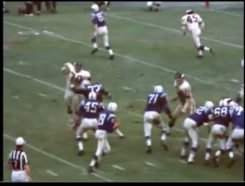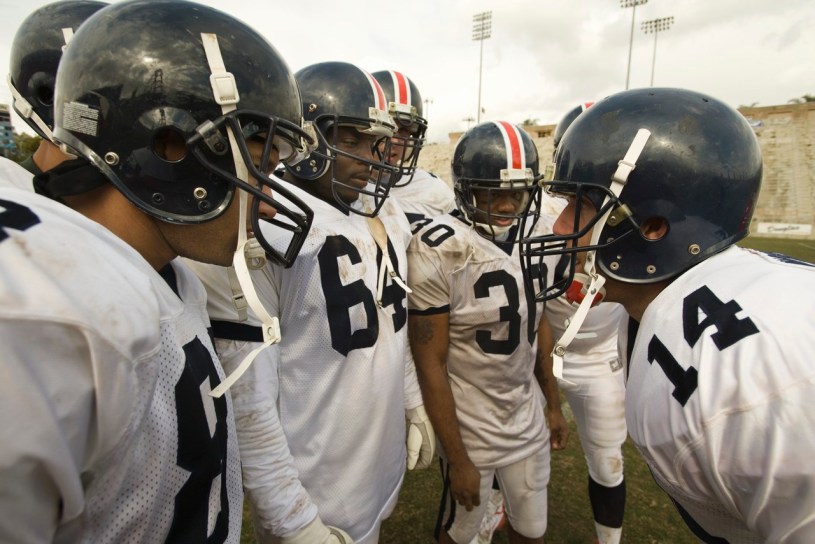By The TV Answer Man team
TV Answer Man, I read your story about how the NFL used to black out the home games of teams. That’s crazy but it got me thinking about those days when the quarterback used to call his own plays. Why doesn’t that happen anymore? Is it because of the technology that permits communications from coaches to QBs? And I’m sorry if this is not a strictly TV question, although maybe it’s technology? — Cliff, Washington, D.C.
Cliff, this is a stretch for us considering that we focus on television. But, yes, there is a technological aspect of the question so we’ll take it. Here goes:
In the early days of the NFL, quarterbacks held a unique and prominent role on the field – they were not just the leaders of the offense but also the primary play callers. This practice, which lasted for decades, allowed quarterbacks to showcase their football IQ and decision-making skills, contributing significantly to the game’s rich history. However, as the game evolved, so did the responsibilities of quarterbacks, leading to a shift where coaches took on a more prominent role in calling plays. And, yes, technology played a role in the shifting of that responsibility.
The Era of the Quarterback as the Field General
In the early years of the NFL, football was a simpler game. Teams often employed a limited number of plays, and the pace of the game was less frenetic than it is today. Quarterbacks had the responsibility of not only running the offense but also deciding which plays to run based on the defense’s alignment. This practice was a testament to the intelligence and football acumen of the quarterbacks of that era. There were also several benefits to the game when the quarterback called the plays. For instance:
Direct Connection with the Game
Quarterbacks who called their plays had a direct connection to the game. They could adjust on the fly, exploit defensive weaknesses, and maximize their team’s offensive potential. Johnny Unitas, the Baltimore Colts quarterback during the team’s glory years in the 1950s and 1960s, was regarded as a master play caller as much as he was a top passer.
Speed of Play
Calling plays at the line of scrimmage allowed for a quicker tempo, catching the defense off guard and minimizing the time they had to adjust and make substitutions. (If Rob Manfred was NFL commissioner, he would probably require the QB to resume as chief play caller.)
Reduced Complexity
Since teams had fewer plays in their playbooks, it was easier for quarterbacks to remember and execute the plays, which often relied on simplicity and execution.
Leadership
Allowing quarterbacks to call plays promoted leadership on the field. They were not just executing orders but actively making decisions that influenced the outcome of the game.

Baltimore’s Johnny Unitas (19) was regarded as the NFL’s best play caller in the 1950s and 1960s.
The Shift Toward Coach-Called Plays
As the NFL evolved, several factors led to the shift away from quarterbacks calling plays:
Increased Complexity
The game of football became more complex as offensive and defensive schemes grew in sophistication. With an ever-expanding playbook, it became impractical for quarterbacks to remember and execute every play effectively.
Specialization
The rise of specialized coaching staff brought in offensive coordinators and play callers, whose sole responsibility was to design and call plays. These specialists had the time and expertise to analyze the opponent’s defense and create effective game plans.
Technology
Yes, technology. The introduction of technology, such as communication systems in the helmets, allowed coaches to relay plays to quarterbacks more efficiently. This led to a greater reliance on coaches to call plays from the sideline.
Time Management
Managing the clock became crucial in late-game situations. Coaches had a better understanding of when to call timeouts, manage the clock, and strategize for specific game situations.
The Modern Quarterback’s Role
Today, quarterbacks are still central figures in the NFL, but their role has evolved. They are no longer the primary play callers but are responsible for executing the coach’s game plan. Nevertheless, their importance cannot be understated as they must have the ability to execute a wide range of plays with precision; call audibles when necessary and provide leadership on and off the field.
Cliff, hope that helps. Happy viewing and stay safe!
Have a question about new TV technologies? Send it to The TV Answer Man at swann@tvanswerman.com Please include your first name and hometown in your message.


